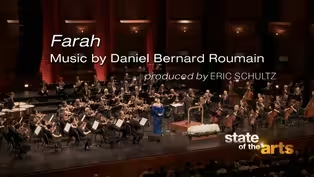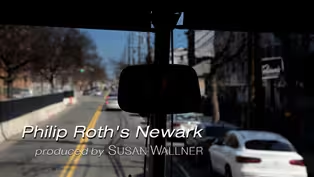State of the Arts
Unfinished Women
Clip: Season 42 Episode 1 | 6m 31sVideo has Closed Captions
Aishah Rahman's underground classic "Unfinished Women," as staged by Camden Rep.
The Camden Repertory Theater produced an immersive production of Aishah Rahman’s rarely produced underground classic from the Black Arts Movement, "Unfinished Women Cry In No Man's Land While A Bird Dies In A Gilded Cage," with a live jazz band. It was staged in a typical New Jersey row house with only 20 seats. Founder and artistic director Desi Shelton describes the mission of Camden Rep.
Problems playing video? | Closed Captioning Feedback
Problems playing video? | Closed Captioning Feedback
State of the Arts is a local public television program presented by NJ PBS
State of the Arts
Unfinished Women
Clip: Season 42 Episode 1 | 6m 31sVideo has Closed Captions
The Camden Repertory Theater produced an immersive production of Aishah Rahman’s rarely produced underground classic from the Black Arts Movement, "Unfinished Women Cry In No Man's Land While A Bird Dies In A Gilded Cage," with a live jazz band. It was staged in a typical New Jersey row house with only 20 seats. Founder and artistic director Desi Shelton describes the mission of Camden Rep.
Problems playing video? | Closed Captioning Feedback
How to Watch State of the Arts
State of the Arts is available to stream on pbs.org and the free PBS App, available on iPhone, Apple TV, Android TV, Android smartphones, Amazon Fire TV, Amazon Fire Tablet, Roku, Samsung Smart TV, and Vizio.
Providing Support for PBS.org
Learn Moreabout PBS online sponsorship[ Jazz music plays ] Tucked away in a residential neighborhood in the city of Camden, there's a theater with a community-focused mission, built on the legacies of the Harlem Renaissance and the Black Arts Movement.
Desi P. Shelton, a Camden native and an MFA graduate from Sarah Lawrence College, founded Camden Repertory Theater in 2005.
Shelton: They doing the Harlem Renaissance.
They do salon-style readings and salon-style plays.
So, if it was good enough for Langston and Zora, how can Desi Shelton think it's not good enough for her?
Parker: I had a dream there was this giant bird with... wings... big enough to block out the sun.
Narrator: Inside Camden Rep's living room setting, two narratives intertwine within one play.
[ Jazz music plays ] Parker: I get one body.
Narrator: Jazz legend Charlie Parker is dying in his mistress's apartment... Wilma: Damn you, Charlie Parker.
Narrator: ...while young women struggle inside a home for unwed mothers.
Parker: I am what I am.
I am how I was framed to be.
Narrator: The play is called "Unfinished Women Cry in No Man's Land While a Bird Dies in a Gilded Cage".
It was written by Aisha Rahman and first produced in 1977 at the height of the Black Arts Movement.
It was a time when writers like Amiri Baraka, Nikki Giovanni, Audre Lorde, and Aisha Rahman were creating new, unflinching works about the Black experience in America.
Wilma: I'm not going to be a mother.
I'm not even going to see my baby.
Michele: She wrote a monster of a play, but amazing.
Parker: All I ever wanted -- All I ever wanted was the music.
Michele: We had the life of Charlie Parker being played out in sort of like this split-stage situation, but then we also had this life of these teenage pregnant women in this hideaway home for unwed mothers.
Wilma: Charlie Parker died today.
Michele: In the play, we see that actually, Charlie Parker dies, and then we see the effect on the main character, Wilma.
Jacobs: Today is the day where you must decide what to do with the baby.
Man: Presenting Charles Parker Jr. and his symphony.
Narrator: The intimacy of the Camden Rep space adds intensity to the performances.
Michele: We have the band in the kitchen, Charlie Parker sort of in this back area of the first floor, and the audience is leaned up against the wall.
Shelton: And you're thrust right in the middle of the action.
You're right up on it.
[ Jazz music plays ] Narrator: This production went even farther, ramping up the sensory experience with a live band.
Shelton: Aisha Rahman wrote the play like it was a jazz song, she said.
She never said that it had to be a band.
That was our artistic aesthetic.
[ Jazz music plays ] Michele: So, this space literally gives it to you in the best way.
It feels like, "Ah, Charlie Parker's going through it.
I'm right here with him."
You hear the stories of these girls.
It feels like "I'm in the home or I'm like their sister or their mom."
Girl: ...the state would give me one if I could prove I was raped like I said.
Narrator: In her memoir, "Chewed Water", Aisha Rahman described growing up as a foster child to a troubled mother in Harlem.
Girl: How come I have to have a baby?
Shelton: She was a foster child, and you can see a sliver of her in every one of those characters.
Like, I can see her foster mother in Nurse Jacobs.
Jacobs: Not in my church.
In my church, you only do it to get a baby and a family.
Bridgeforth: "Unfinished Women" is such a unique play, and Aisha Rahman speaks to voices that others would not listen to.
Wilma: Yes, I am angry.
You go through this day like a breeze and still... Bridgeforth: Our mission is about giving a platform, a meaningful platform, a professional platform for women of color to have their voice heard.
It's essential.
Woman: Ready?
Five, six, seven eight.
Bridgeforth: A key component of what we do at Camden Repertory is our P.A.C.E.
program, which is Preparing Artists for College Entrance.
It trains young people in a range of performing arts skills, and then we marry that with a very rigorous academic program and academic support.
Most of the cast is either in P.A.C.E.
or are graduates of the P.A.C.E.
program, both in the cast as well as in the orchestra.
Shelton: These students in the P.A.C.E.
program, when we started in 2007, they have gone on to the best schools in the country for what they do.
Joseph Streater was originally from the P.A.C.E.
program and graduated from Berklee College of Music.
He's played with some of the top artists in the country.
Michele: Being a part of the P.A.C.E.
program as a high schooler and then coming into the professional realm of Camden Rep and being in a production was life-changing.
Girl: The man that we all need.
You hear me, Charlie Parker?
We need you.
Bridgeforth: The impact of the work is tremendous.
People's perception of Camden in general change, because then they see that there is positivity and there is excitement and there is deep good in the city and also amazing, amazing talent.
Narrator: Camden Rep continues to grow, thanks to leaders like Desi Shelton, who returned home from Sarah Lawrence College with a mission to cultivate quality theater within the community.
Jacobs: Foolish women!
Wake up!
Bridgeforth: Desi continues to be a pied piper for creativity right here in Camden, and she does that through her own professional training.
She's been awarded fellowships from all across the country.
Michele: I know that's surely an inspiration to other young black women to see her stay in her community and build something amazing.
Shelton: Ozzie Jones, the one who -- I begged him to play Charlie Parker, he said to me in 2004, when I first came back from Sarah Lawrence, "It's your responsibility to give your hood all of that that you learned at Sarah Lawrence and give it back to your hood."
So, I say the same thing to my students.
Everything that you've learned, it is your responsibility to come back here and give it to our hood.
Farah: Music by Daniel Bernard Roumain
Video has Closed Captions
Clip: S42 Ep1 | 8m 59s | Haitian-American composer, violinist and activist Daniel Bernard Roumain's "Farah (Joy)." (8m 59s)
Video has Closed Captions
Clip: S42 Ep1 | 9m | The celebrated novelist Philip Roth set most of his work in his hometown of Newark, NJ. (9m)
Providing Support for PBS.org
Learn Moreabout PBS online sponsorship
- Arts and Music
The Best of the Joy of Painting with Bob Ross
A pop icon, Bob Ross offers soothing words of wisdom as he paints captivating landscapes.













Support for PBS provided by:
State of the Arts is a local public television program presented by NJ PBS


